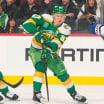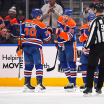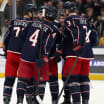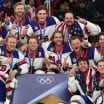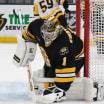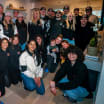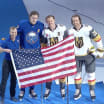Editor's note: The life of an on-ice NHL official can be both thrilling and a grind. It involves pregame rituals, extensive travel and, believe it or not, coming up with creative ways to do laundry.
There is plenty of unseen work to do before and after games, and little glory.
NHL.com spent time with linesman Greg Devorski at three games in January to get an inside look at the life of an NHL official.
Greg Devorski details life as NHL linesman
Longtime official tells of preparation, travel, adrenaline rush
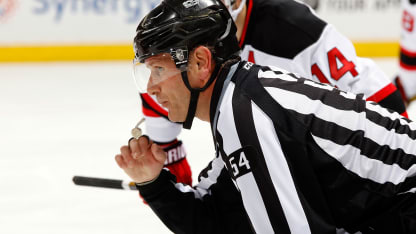
© Gerry Thomas/Getty Images
By
Tim Campbell
NHL.com Staff Writer
Tears were flowing after Greg Devorski retreated to his basement bedroom.
The distance from St. Jacob's to Guelph, Ontario, is 18 miles, but one night in 1986 the trip home seemed to take an eternity, filled with doubts about and second-guessing of his work officiating a midget hockey game in which players had become careless and disrespectful when it grew one-sided.
The rougher the game got, the more penalties the young referee saw and called. And the more he called, the angrier the parents, particularly of the aggressive losing side, got. They barked at the 17-year-old official, harangued him during the game, as he exited the ice and even on the way out of the arena.
"It got really personal," Devorski said three decades later. "I wondered on the way home if I'd done that bad a job. I was really questioning myself. I remember walking through the back door and my mom and dad were sitting at the kitchen table and they asked about the game and I never answered.
"I just went down to my room and my dad came down. I was crying my eyes out, worried that I'd done something wrong, and he looked at me and said, 'Hey, this is only the first one. There will be a lot of tougher ones than this.' "
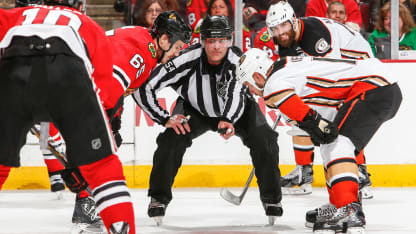
© Bill Smith/Getty Images
And then Ontario officiating legend Bill Devorski shut his son's door.
Greg Devorski was stunned momentarily by his father's apparent lack of compassion, but said years later that he realized the incident was a glimpse into his future: a career as a respected and long-serving NHL linesman.
"I thought, 'So much for a hug and a pat on the back,'" said Devorski, 47. "I understood what he said and he was right. It was just a first step, learning that there aren't too many pats on the back in this kind of business. And if that's what I wanted to do in the future, I'd have to deal with the scrutiny and criticism from not only my peers but from fans and people involved in hockey.
"It was a learning experience but he was always there for support."
Devorski has plenty of experience now, having served as an NHL linesman for 23 seasons. After working the game between the Los Angeles Kings and Philadelphia Flyers at Wells Fargo Center on Saturday, he has officiated 1,540 games, about 100 fewer than Sidney Crosby and Alex Ovechkin have combined to play.
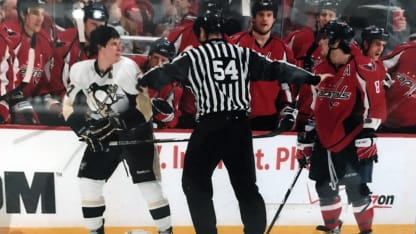
There are no line changes for officials -- they are on the ice 60 minutes, or longer, per game - which is why their pregame preparation is as important as what they do once the puck drops.
On most game days, Devorski follows a set routine.
He'll usually choose a later flight the night before, check into his hotel room and go to sleep. Then he'll have breakfast, often with the officials who will also be working that night's game, and work out for up to an hour.
"Nothing hard, just to wake the body up," the 6-foot-4 Devorski said. "Always lots of stretching."
He gets together with the other officials for lunch to discuss the upcoming game and go over their homework.
"Things like personnel, what happened last time they played," he said. "We like to keep our minds refreshed about the circumstances of any game."
Minds fresh and bodies in shape -- the days of pasta and beef for lunch are long gone for Devorski and many of his colleagues.
"That's going by the wayside," Devorski said. "Chicken or Cobb salads, that's more like it now. Guys are so much more health conscious when they eat."
After lunch, Devorski heads back to the hotel for perhaps the most important part of his regimen: a nap.
"Some guys go for a walk; whatever works for them," he said. "But you can bet your bottom dollar for almost everybody there's a nap of at least 30 minutes in there."
About 90 minutes before puck drop, Devorski and his crew arrive together at the arena - as they did last month at MTS Centre, where the Winnipeg Jets recently hosted the Montreal Canadiens, and NHL.com observed the officiating crew behind the scenes.
There would be stretching, rides on stationary bikes and even more working out in the room for Devorski and his crew.
"At the rink, pregame workouts are a must," Devorski said. "It helps get the blood flowing and warms and loosens up the joints and muscles."
"The game's getting so fast, faster every year and it's not going to wait for you," referee Steve Kozari said. "Today, everybody works out."
While Devorski and the others got their bodies ready for the night's action, they also did more prep work, focusing on the teams and coaches from the upcoming game.
"It's my job to have an understanding [of] who I'm dealing with in every game and, for instance, know how much rope I'll give a guy before I kick him out of the faceoff circle," Devorski said.
The other linesman on this night, Devin Berg, reviewed faceoff procedures and icing standards with Devorski.
About three minutes before the national anthem, the officials moved to the ice. The referees went first, Devorski joked, so they could feel the greeting from the fans.
To which referee Tom Kowal said, "It's because you're soft."
No time to be soft now. It was game time.
It was a fairly uneventful game for Devorski, who said, "It was pretty quiet at both benches." There were no scrums between the Jets and Canadiens, but across more than two decades in the NHL, Devorski has seen his share, learned how to manage such situations and even been smacked a time or two, mostly because he and his partner moved in to break things up too early.
"It all depends who's fighting," Devorski said. "And you have to be aware of what caused the fight. Something in a previous game? Something in that game and now there's retribution? If there's some mismatch, you would tend to get in there quicker if you can. You have to be able to read these situations. It's second nature to know when to get in.
"And over time, I've learned how to talk to players better, let them know we're coming in and it's time to calm things down."
Devorski himself said he has a hard time calming down immediately after a game, when the officials, who are a sweaty mess, are given food and drinks in their room at the arena. Nobody else -- off-ice officials, supervisors, scorers, security -- is allowed in the room until 10 minutes after the game, which gives the crew time to debrief and wind down.
After leaving the arena, the officials will sometimes drop into the hotel bar for a snack, salad or beer, but Devorski said some nights he does not fall asleep until about 2 a.m.
Adhering to a hockey version of attorney-client privilege, Devorski will only speak in generalities when it comes to what goes on between players and officials during a game. Quality work by both player and official, he said, leads to respect.
"It is reciprocated," Devorski said. "We do have our disagreements but most of the time our private 1-on-1 conversations don't last long and are left on the ice. There are times when emotions rise and things get escalated. That's where experience from official and player play a big part.
"Having officiated in the NHL the last 24 years, many coaches and team personnel were players in that time. In some cases, now their sons are playing. It can help with the respect among us. They know me, my personality and my capabilities, as I do theirs. It's also a good icebreaker with their sons some nights.
"But respect is a two-way street as an official. I have to earn the respect of players, coaches, GMs and my own superiors as they do from me. My actions through what I say and how I perform on a nightly basis is a big part of earning their respect."
\\\\*
Because of his famous father, respect didn't come easy for Devorski during his early years as an official.
Bill Devorski, who died Nov. 25, 2015, at the age of 85, worked games for 35 years in the Ontario Hockey Association, earning a reputation for being tough but fair. In 1949 he was one of nine founding members of the Guelph Hockey Referees Association, which has produced NHL officials including George Ashley, Will Norris, Ray Scapinello, Lou Maschio, Ken Bodendistel, Bill McCreary and Ron Asselstine.
The list also includes Greg Devorski and his older brother, Paul, a referee who worked 1,594 NHL regular-season games over a 26-year career that ended in 2015.
"I know he was a pretty proud papa," Paul Devorski said of Bill.
Their father was so well-regarded and connected in hockey and officiating circles that it led to some criticism that somehow the sons weren't capable.
"Paul and I had to deal with that all the way through," Greg Devorski said. "We heard it a lot, 'The only way Paul and Greg got to the NHL was because their old man got them in there.'
"First, I can tell you the NHL doesn't hire anybody they don't think can do the job because they wouldn't embarrass themselves. Second, my dad definitely opened doors for me and Paul but we had to go through that door and prove ourselves because if we didn't, we weren't going anywhere."
More often now, Devorski said, he's honored when he hears those around the game speak highly of his father and brother.
"Once we got past a lot of that other stuff, after we had earned our jobs on merit, we just worried about doing our jobs at the highest level and kept our focus where it needed to be."
Greg originally wanted to play hockey, and was a forward of some ability through the AAA ranks. But when his midget team opted to form a Junior B team the following season, he decided that wasn't for him.
"After that and I started refereeing just on the side for something to do," Devorski said. "It was like a part-time job. I was only 15, so I joined up with the Guelph Hockey Referees Association.
"I didn't have any aspirations of getting into the NHL when I started but I just thought I could do some of it. My dad did it for 35 years in the OHA and major junior. It took a life of its own after a while."
After spending a season around town, Devorski got a call from Norris, a former NHL linesman and OHA assigner, with an offer to work a wider range of games around Ontario. Devorski's skating ability and knowledge of the game from his playing days fostered his progress as an official.
He worked games in senior leagues, the Tier 1 junior Ontario Hockey League and then the American Hockey League, all before he was 22.
At 23, Greg got a job offer from the NHL in the summer of 1993, the same year the League added the Florida Panthers and Mighty Ducks of Anaheim, its fourth and fifth expansion teams since 1991 (the San Jose Sharks, Ottawa Senators and Tampa Bay Lightning were the others). The NHL schedule expanded from 840 games to 1,092 in a span of three seasons.
"I had been wondering about it but didn't think it could happen that soon," Devorski said. "I had time on my side but that's when the League was going through expansions, so they were hiring.
"And now I'm into my 24th year. It seems like yesterday I just started."
\\\\*
There have been plenty of changes in the NHL since Devorski's arrival, but one aspect of his job has remained constant - his lack of a personal equipment manager.
Players simply toss their sweaty equipment and jerseys into a laundry bin after a game for a team employee to handle, but Devorski is on his own.
"We pack our own bags, do our own laundry and it all comes with us," he said. "We're always drying out our stuff in our [hotel] rooms and they can smell pretty bad from equipment.
"Players don't have to go through much of that stuff. Us, we start from home fresh and we work our games, and after games pack it up and it's usually soaking wet.
"It can stink. Some hotels don't have laundry. More often than not, my undergarments will go in the bathtub. I get some soap and water and wash them around then hang them up."
And that's not all when it comes to Devorski's resourcefulness.
"Honestly, after some games, I'll take off my gear but leave on my tights and T-shirt and socks on and just go right in the shower and wash them that way," he said. "They were already wet anyway… and it gets them a little fresher. Not the ideal cleaning cycle but [the clothes are] clean enough to use them again and they smell better and don't stink up my room as much.
"My family will come on the road once in a while, or my dad used to, and they'll come to my room and go, 'Holy cow, how do you sleep in this room?'
"You just get used to it. I don't even notice it anymore, that locker room, hockey kind of smell."
It's just part of Devorski's routine - as is the heavy travel.
Devorski, based in Kitchener, Ontario, estimated that his average road trip is five days, but he can be away for nine or 10 days.
NHL officials know their schedules as much as six weeks in advance in the early part of the season. Closer to the end of the schedule, it may be as little as two weeks out.
Officials are based all over the U.S. and Canada but work everywhere. In the case of linesmen, Devorski said, games close to home might be assigned a little more frequently. During a season, he might get five games each in Toronto, Buffalo and Detroit - cities that are reasonably easy to drive to.
"I'll often be home for three or four days between trips," Devorski said. "But I might also have one of those close games that I can drive to, while I'm home. Very seldom, like maybe once, will you have four or five days off in a row over the course of a year, not including things like the All-Star break."
Video: PIT@BUF: Sabres, Penguins honor Devorski pregame
Referees and linesmen have individual schedules, rarely working consecutive games with the same crew members. The travel can be a burden, no matter how accustomed you are to it, Devorski said.
"For me personally, I like traveling on my own," he said. "I'm on my own schedule and I prefer that. It is nice to travel with somebody once in a while but you get used to traveling on your own and you find it easier because you're in charge of your day."
Devorski said he used to love the travel because it was new to him and allowed him to explore North America. These days, however, it takes him away from his wife, Tamara, and daughters Rachel, 21, and Danielle, 19.
"When I got hired, I didn't have a family," Devorski said. "Going away for a week at a time, you miss things while they're growing up, like a first step, and there were no cell phones and FaceTime then.
"As our girls have gotten older, I've learned to cherish the time I get at home. Especially in the summer. My wife, when I met her, knew what she was getting into. She's great -- she raised our kids 80 percent of the time. It has never fazed her."
With so much travel time and almost all of it spent by himself, it might seem the job could be a lonely one.
Not for Devorski.
"I think a lot of guys would agree with me, that the travel does fly by quickly," he said. "And when you get to your city, you're with your guys that night or next day. You never go long without people around you. Sometimes having your own space is actually good. You just get used to traveling alone. It's kind of like a comfort zone."
\\\\*
Devorski's first regular-season NHL game was between the Florida Panthers and Tampa Bay Lightning at the Thunderdome (now Tropicana Field) in St. Petersburg, Florida, on Oct. 9, 1993. He worked with Denis Morel and Bob Hodges before a then-NHL record crowd of 27,337.
He officiated his fourth NHL game, the Jets at the Detroit Red Wings, with Paul.
Eleven years older, Paul had been a hard-nosed defenseman and captain of the Guelph junior team that won the 1978 Centennial Cup, the Canadian Tier II championship.
"I loved watching Paul when he played junior," Greg said. "Every Friday night and Sunday afternoon, just couldn't wait to go to watch him. I'm 7, 8, and it's just pure love of hockey."
Another highlight for Greg was his being assigned an outdoor game, the 2003 Heritage Classic in Edmonton, with Randy Mitton and referees Dan Marouelli and Kevin Pollock.
"I had been on staff 10 years but there were lots of guys who could have ended up working that game," Greg said. "There were so many guys ahead of me in seniority then and when I saw the assignment, it kind of blew me away."
At a game time temperature of minus-4 Farenheit, there were all kinds of issues: bone-chilling dressing rooms, chippy ice, frozen whistles, Vaseline all over the officials' faces and necks.
And frostbite.
"Kevin and I forgot about having the right socks and enough socks and we both ended up getting frostbite," Devorski said. "After the game we were at Dan's mom's house, rubbing our feet by the fire. It took some days for the discoloration to come out."
Devorski's first taste of international games came when he was assigned to a crew in Europe for the 2004 World Cup of Hockey. Ten years later, he was on an international stage again, working the 2014 Sochi Olympics, an "awesome" experience.
"It was great hockey at those Games," Devorski says. "I was fortunate enough to work the gold-medal game. It was a good game but the game that sticks out for me, one of the best games I've ever seen, was the U.S.-Canada semifinal (a 1-0 Canada victory)."
He worked with linesman Ivan Dedioulia from Belarus and NHL referees Brad Meier and Kelly Sutherland. Devorski, who officiated the Stanley Cup Final in 2006 and 2010, said this was the most nervous he's ever been for a game.
"Just shaking in the room, butterflies," he said. "Those guys played hard, hard hockey. It was intense. Every moment was, every faceoff, every whistle. I knew all the players and in an NHL game, there's that little bit of chatter and joking once in a while during a stoppage or commercial. In that game, it was all business all game. No banter. All serious. Everyone was there to do a job."
Devorski officiated his second outdoor game at the 2017 Scotiabank NHL Centennial Classic in Toronto on Jan. 1. The mild weather, and the fact that he had his family with him, made it a lot more fun than his experience in Edmonton in 2003. (His family got to share in another memorable moment this season, joining Devorski on the ice when was honored prior to his 1,500th NHL game Nov. 19, 2016, in Buffalo.)
"When we (the officials) walked out to the ice for the game, it was like, 'What a party,'" Devorski said that day. "I can't speak for the guys in the room but when I got out there, I had to tell myself, 'Focus on the game.' It was an adrenaline rush today and yesterday (for the family skate). I was trying to take in all the sights and sounds and it was a party atmosphere but there were two points on the line.
"You had to separate the fun from the work. But once I get the feel of the puck in my hands, make my first call, you get into the game."
The game ended with an Auston Matthews overtime goal to give the Toronto Maple Leafs a 5-4 victory against the Detroit Red Wings.
"Just to be part of that game, we were talking after that, and we know people are going to talk about that third period and overtime for some time," Devorski said.
\\\\*
NHL players have never been bigger, faster or stronger than they are today. That, and rule changes, have led to a faster, more relentless game (with fewer scrums, officials say) on most nights, a reality that has required officials to improve their own quickness and thinking. There are also coaches challenging offside and goalie interference calls when goals are involved.
Devorski said the microscope on the blue line has complicated matters.
"I have no problem with this when it comes for what was intended, the betterment of the game," he said. "It's important, especially in a close game. You want a goal to be a legal goal.
"What I don't like is when coaches don't use the rule for what it's intended for … when they know it's not offside and they're going for a prolonged timeout. But nine times out of 10, any new rule that comes in, coaches try to find a way around it. They're trying to win, but it's frustrating sometimes."
The suggestion has also been made that now, being able to rely on replay, linesmen are making safe calls, letting more offside penalties go because they know errors can be fixed.
"Ridiculous," Devorski said. "I'm never making an error that way on purpose. I'm judged on my work. I never want to be judged in that way.
"We do things to the absolute best of our ability, as we always have. Now, the League has invested a lot in technology, so it would be a shame not to use it."
Devorski said some aspects of current technology do help officials. The League sends them videos of particular calls to get their take on why a call was or wasn't made, though, he said, referees receive such videos more often than linesmen.
"We have a system now that we can log in and look at every faceoff we did in a game, a great tool to have to see if anything needs improving and to help us with our consistency," Devorski said.
But technology can only help so much. Officials, Devorski said, have to excel at awareness during the entire game.
"Putting out little fires, like scrums, before they escalate and knowing the players tendencies helps make the referee's job a little easier," Devorski said. "Knowing where to go and who to watch for is very important after stoppages. There is a lot more to lining a game than just getting the puck and getting to the next faceoff location."
Officials, like players, sometimes have their habits. Devorski, for instance, prefers to start a game working the visitors' end of the ice before switching with his partner halfway through a game.
He's also conscious of drinking more fluids than he used to.
"A team trainer told me years ago he felt we as officials didn't drink enough during the games," he said. "It is important because it is very easy to get dehydrated and tweak a muscle while working games."
\\\\*
The job of linesman in the NHL has its exciting and thrilling days. It also has its monotonous ones. It can be exhausting, smelly, and there is not much glory. When is the last time anyone asked a linesman for an autograph?
But Devorski said he still gets chills when he takes the ice, the excitement of a game getting his adrenaline going.
"My legs were shaking before the game, ready to go, nervous, butterflies," Devorski said after the Centennial Classic. "I always like getting butterflies and get my leg shaking a bit before a game. I know I'm in it.
"If I lose that, it'll be time to think about moving on."


